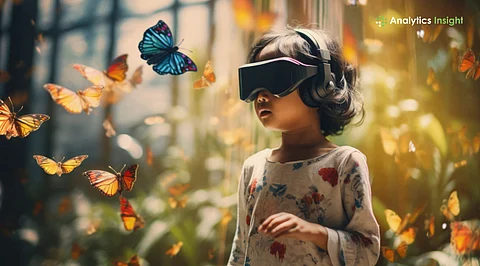Technology
Balancing VR and AI: Shaping Kindness in the Next Generation

Technological advancements in virtual reality (VR) and artificial intelligence (AI) are transforming childhood experiences, prompting discussions about their impact on emotional and moral development. As children increasingly engage with these digital tools, the challenge lies in ensuring that technology enhances rather than replaces authentic human interactions.
Integrating Technology with Real-World Experiences
While VR and AI have the potential to foster empathy and kindness, they must be integrated thoughtfully into children’s lives. Many young people, particularly those in Generation Z, grow up with VR goggles and intelligent digital companions, leading to a reliance on virtual experiences over traditional forms of learning. This shift raises important questions about whether these technologies are nurturing emotional intelligence or conditioning children to seek affirmation from artificial sources.
According to research, immersive VR experiences can significantly enhance cognitive processes by allowing children to explore scenarios, such as walking on Mars or swimming with marine life, in a way that traditional books or play cannot. These experiences stimulate imagination and curiosity. However, they may also blur the line between reality and simulation, leading to challenges in discerning genuine emotions from digital portrayals.
Children’s interactions with digital characters and gamified learning environments have been shown to improve focus and adaptability. Yet, there is a growing concern that such exposure could diminish sensitivity to real-world emotions. Experts emphasize the importance of maintaining a connection to genuine experiences, ensuring that children benefit from VR without losing touch with their emotional development.
The Ethical Role of Parents in a Digital Age
AI-powered virtual reality systems offer tailored learning opportunities, simulating real-life social situations such as conflict resolution and teamwork. For instance, a VR classroom might use avatars to express various emotions, providing children with opportunities to practice emotional responses in a controlled setting. This approach can be particularly beneficial for children with special needs who face challenges in reading social cues.
Nevertheless, experts caution against the potential for manipulation. When technology starts to dictate emotional responses, it risks creating conditioned reactions rather than fostering authentic feelings. As such, it is crucial to strike a balance where technology serves as a supportive tool rather than a dominating influence.
The growing presence of AI educators and digital mentors in children’s lives raises a significant dilemma concerning influence. Traditionally, parents have shaped their children’s values, ethics, and emotional intelligence through direct interactions. With AI playing a more prominent role in education, the question arises: Who exerts greater influence—the caregiver or the code?
To ensure that moral development remains intact, parents must set clear ethical boundaries regarding educational technology. They should communicate the differences between authentic experiences and those mediated by technology.
While VR and AI can facilitate the development of kindness through virtual experiences, they cannot replicate the depth of genuine human connections. Even as these systems promote empathetic conversations, nothing compares to the comfort that comes from real-life relationships. It is essential to nurture a generation that understands the importance of kindness rooted in authentic emotional connections.
As children navigate the complexities of emotional development, the role of technology should be to complement rather than substitute traditional forms of learning. Encouraging outdoor play, creative endeavors, and real-life social interactions remains vital to fostering emotional richness and creativity.
In conclusion, the responsible use of VR and AI can indeed foster empathy by recreating diverse life experiences. However, the foundation of emotional intelligence must be built through meaningful relationships and discussions. Only through a balanced approach that combines digital learning with genuine human interaction can we ensure that children develop a true understanding of kindness and empathy in today’s rapidly evolving world.
-

 Science1 month ago
Science1 month agoNostradamus’ 2026 Predictions: Star Death and Dark Events Loom
-

 Technology2 months ago
Technology2 months agoOpenAI to Implement Age Verification for ChatGPT by December 2025
-

 Technology7 months ago
Technology7 months agoDiscover the Top 10 Calorie Counting Apps of 2025
-

 Health5 months ago
Health5 months agoBella Hadid Shares Health Update After Treatment for Lyme Disease
-

 Health5 months ago
Health5 months agoAnalysts Project Stronger Growth for Apple’s iPhone 17 Lineup
-

 Technology5 months ago
Technology5 months agoElectric Moto Influencer Surronster Arrested in Tijuana
-

 Education5 months ago
Education5 months agoHarvard Secures Court Victory Over Federal Funding Cuts
-

 Health5 months ago
Health5 months agoErin Bates Shares Recovery Update Following Sepsis Complications
-

 Technology7 months ago
Technology7 months agoMeta Initiates $60B AI Data Center Expansion, Starting in Ohio
-

 Technology6 months ago
Technology6 months agoDiscover How to Reverse Image Search Using ChatGPT Effortlessly
-

 Science4 months ago
Science4 months agoStarship V3 Set for 2026 Launch After Successful Final Test of Version 2
-

 Technology7 months ago
Technology7 months agoRecovering a Suspended TikTok Account: A Step-by-Step Guide









